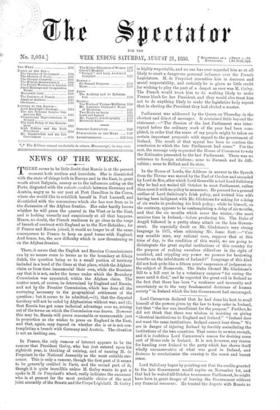In France, the only rumour of interest appears to be
the rumour that President Gr6vy, who has just entered upon his eightieth year, is thinking of retiring, and of naming M. de Freycinet to the National Assembly as the most suitable suc- cessor. This is only a rumour, though the first part of it seems to be generally credited in Paris, and the second part of it, though it is quite incredible unless M. Gr6vy wants to put a spoke in M. de Freycinet's wheel, really indicates the successor who is at present far the moat probable choice of the next joint assembly of the Senate and the Corps algislatif. M. Gr6vy is highly respectable, and no one has ever regarded him as at all likely to exert a dangerous personal influence over the French Legislature. M. de Freycinet resembles him in decorum and moral respectability, and certainly he is given as little credit for wishing to play the part of a despot as ever was M. Gr6vy. The French would trust him to do nothing likely to make France blush for her President, and they would also trust him not to do anything likely to make the legislative body repent that in electing the President they had elected a master.
Parliament was addressed by the Queen ou Thursday in the shortest and driest of messages. It contained little beyond the statement : —" The Session of the last Parliament was inter- rupted before the ordinary work of the year had been com- pleted, in order that the sense of my people might be taken on certain important proposals with regard to the government of Ireland. The result of that appeal has been to confirm the conclusion to which the late Parliament had come." For the rest, the message only requested the House of Commons to vote the Estimates presented to the last Parliament. There was no reference to foreign relations ; none to Burmah and its diffi- culties ; none to Belfast and its riots.


































